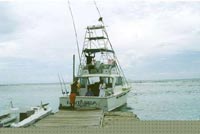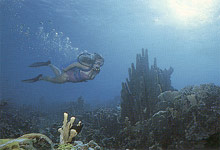Frequently Asked Questions
I've always wanted to learn to scuba dive (or snorkel). How do I get started? The best way is to visit your local PADI Dive Center or Resort. There are more than 3000 of them worldwide. Is it hard to learn to scuba dive? No, in fact, it's probably easier than you imagine -- especially if you're already comfortable in the water. PADI's entry-level diver course is split into knowledge development, confined water (pool) skill training and four scuba training dives. The course is "performance based," which means that you progress as you learn and demonstrate knowledge and skill. How long does it take to become a certified scuba diver? PADI courses are "performance based," which means that you earn your certification when you demonstrate that you've mastered the required skills and knowledge. Some people learn faster than others, so how long it takes you may vary. The PADI Open Water Diver course (beginning course) is typically split into five or six sessions with tremendous flexibility. The course may be scheduled over as little as three or four days, or as much as five or six weeks, or something in between, depending upon student needs and logistics. As a rule of thumb, most students complete their initial certification in three or four weeks. How old do you have to be to become a certified diver? Twelve years old. If you're between 12 and 15, you receive a Junior Open Water Diver certification, which means you should dive with a certified adult. When you turn 15, you can upgrade your Junior certification to a regular Open Water Diver certification. Do I have to meet any special qualifications or considerations before I can participate in a scuba class? No. Generally speaking, anyone in good average health and at least 12 years old can participate. As a precaution, you'll be asked to complete a routine medical questionnaire. If anything on the questionnaire indicates something to be cautious about, you'll check with your physician to make sure it's acceptable to dive. Do I have to be a great swimmer to be certified as a PADI Open Water Diver? No. All you need to be is a reasonably proficient swimmer who is comfortable and relaxed in the water. The swimming requirement for certification is an easy 183 metre/200 yard nonstop swim (with no time or specific stroke requirement) and 10 minute tread/float. Is scuba diving expensive? Not really. Like any hobby or recreation, you can invest a lot or a little, depending upon your interest level. Because most dive centers and resorts rent equipment, you can invest in equipment over time, renting what you don't have until you make the investment. Besides distant dive destinations, you probably have good diving not too far from where you live, so even travel costs are flexible enough to accommodate even the tightest budget. To pick an average, most people find the costs of scuba diving similar to those associated with snow skiing. What equipment do I need before I take scuba lessons? Scuba courses vary in what equipment they provide, so it's best to check with your instructor ahead of time. Generally speaking, though, you'll probably want your own mask, snorkel and fins, which are all pieces of equipment that are most comfortable when personally fitted. Your local PADI Dive Center or Resort can help you select quality equipment that fits right and lasts. Snorkeling seems easy. Do I really need lessons? If you're comfortable in the water, probably not. However, if you'd like some guidance, just ask a PADI professional. Even if you take to snorkeling like a duck takes to water, you'll find snorkel tours arranged by a PADI Dive Center or Resort get you to some of the best snorkeling spots. How long does a tank of air last? This is a common question that, unfortunately, doesn't have a single
answer. People breathe at different rates, and you breathe faster when
you're swimming than when you're resting. Also, the deeper you go, the
faster you use your air, and, you can get different size tanks. So,
the answer is "it depends;" this is why divers have a gauge
that tell them how much air they have at all times. As an approximation, though, a diver sightseeing in calm, warm water in the 5 metre/15 foot to 10 metre/30 foot range can expect the average tank to last about an hour. My ears hurt when I dive to the bottom of a pool. Won't they hurt when I scuba dive? Your ears hurt because water pressure pushes in on your ear drum. In your scuba course, you'll learn a simple technique to equalize your ears to the surrounding pressure, much like you do when you land in an airplane, and they won't hurt at all. In the movies and on TV, divers are always running into sharks or eels. Are marine animals really much of a concern? Virtually all aquatic animals are passive or timid. There are a few that can bite or sting defensively, but you can avoid these simply by watching where you put your hands and feet, and by not touching any animal you don't recognize. Divers aren't natural prey for sharks, so shark attacks are very rare -- more people die each year from bee stings than shark attack. What is the PADI International Resort Association? PADI is the Professional Association of Diving Instructor, the largest scuba training organization in the world. PADI develops scuba programs and diver training products, monitors the scuba training conducted by more than 67,000 PADI professionals worldwide, maintains diver certification records and issues your diver certification credentials. In addition, PADI maintains various support services for PADI Dive Centers and Resorts. Founded in 1966, today you'll find PADI professionals in more than 170 countries and territories, and international service offices in nine countries. Approximately seven out of ten North American divers are certified by PADI, and approximately 55% of all divers worldwide are certified by PADI.
What is the PADI International Resort Association? The PADI International Resort Association (PIRA) is an association of resorts, dive boats, diver operators and hotels that offer recreational scuba and /or snorkel tours, PADI instruction and services. What is Project AWARE? Project AWARE stands for Aquatic World Awareness, Responsibility and Education, and is the environmental-educational umbrella for PADI and PADI professionals worldwide. Project AWARE programs have included beach cleanups, environmental presentations, research and other efforts to help preserve and protect the underwater world. Is scuba diving dangerous? Not really. Statistics show that recreational scuba diving is about as safe as swimming. Certainly there are potential hazards -- which is why you need training and certification -- but like driving a car, as long as you follow the rules and use common sense, it's pretty safe. I need vision correction. Is that a problem? Not at all. If you wear soft contact lenses, you shouldn't have problems wearing them when you dive. If you wear hard lenses, you'll want the gas permeable type for diving. See your eye doctor about these if you don't have them now. Another option is to have prescription lenses put into your mask. See your PADI professional about this service, it's pretty safe. I lost my certification card. Can I get another one? How long does it take? Go to your PADI Dive Center or Resort; they can help you replace your card. It generally takes about two weeks. If you plan to dive sooner than that, have the PADI Dive Center or Resort that you're diving with call PADI. PADI will try to FAX out your certification information so you can dive. If your certification was issued in the U.S., Guam or the Caribbean since approximately 1984, a PADI Dive Center or Resort can usually verify your certification through the computerized Dive-Chek system at any time of day. Scuba diving sounds exciting, but I'm not sure if it's for me. Can I try it without signing up for a course? Absolutely. The PADI Discover Scuba Diving program allows you to make a shallow scuba dive supervised by a PADI professional after a short pool session to familiarize you with the equipment and some techniques. You can usually do this in a few hours. There's also a program that lets you try scuba in a swimming pool only. This takes even less time, and it's popular in places that may not have an actual scuba diving site at hand. What's in a scuba tank? Oxygen? Recreational divers breathe air, not oxygen. It's filtered to remove impurities, but otherwise, it's air like you're breathing now. How do I find out more about diving or snorkeling? Visit your local PADI Dive Center or Resort for complete information about PADI programs and how you can get started.
|
            |
||||||||||||||||||
 |
|
||||||||||||||||||
|
Dive Seaworld Resorts Jamaica
Limited
Rose Hall, Montego Bay P.O. Box 610, Jamaica, W.I. Telephone: (876) 953-2180 or 2022 |

